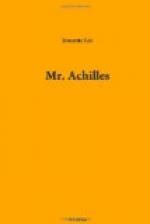“Do you what to go home, Alcie?” The face smiled at him. “Don’t you like it here?” A gesture touched the garden.
“I like—yes. I go home—with you,” he said simply.
“You must stay till you are strong,” said the father, watching him. “You were hurt, you know. It takes time to get strong.... You remember that you were hurt?”
The words dropped slowly, one by one, and the day drowsed. The sun—warm as Athens—shone down, waiting, while the boy turned slowly on his side... his eyes had grown dark. “I try—remember” His voice was half a whisper, “—but it runs—away!” The eyes seemed to be straining to see something beyond them—through a veil.
Achilles’s hand passed before them and shut them off. “Don’t try, Alcie. Never mind—it’s all right. Don’t mind!”
But the boy had thrown himself forward with a long cry, sobbing. “I—want—to—see,” he said, “it—hurts—here.” His fingers touched the faint line along his forehead. And Achilles bent and kissed it, and soothed him, talking low words—till the boy sat up, a little laugh on his lips—his grief forgotten.
So the detectives went back to the city—each with his expensive cigar—cursing luck. And Achilles, after a day or two, followed them. “He will be better without you,” said the surgeon. “You disturb his mind. Let him have time to get quiet again. Give nature her chance.”
So Achilles returned to the city, unlocking the boy’s fingers from his. “You must wait a little while,” he said gently. “Then I come for you.” And he left the boy in the garden, looking after the great machine that bore him away—an unfathomable look in his dark, following eyes.
XXI
A CONNOISSEUR SPEAKS
The next day it rained. All day the rain dripped on the roof and ran down the waterspouts, hurrying to the ground. In her own room the mistress of the house sat watching the rain and the heavy sky and drenched earth. The child was never for a minute out of her thoughts. Her fancy pictured gruesome places, foul dens where the child sat—pale and worn and listless. Did they tie her hands? Would they let her run about a little—and play? But she could not play—a child could not play in all the strangeness and sordidness. The mother had watched the dripping rain too long. It seemed to be falling on coffins. She crept back to the fire and held out her hands to a feeble blaze that flickered up, and died out. Why did not Marie come back? It was three o’clock—where was Marie? She looked about her and held out her hands to the blaze and shivered—there was fire in her veins, and beside her on the hearth the child seemed to crouch and shiver and reach out thin hands to the warmth. Phil had said they would not hurt her! But what could a man know? He did not know the sensitive child-nature that trembled at a word. And she was with rough men—hideous




